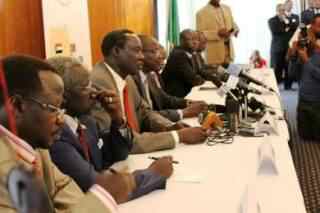Former SPLM detainees warn of South Sudan’s collapse
May 17, 2015 (JUBA) – South Sudan’s ongoing conflict could plunge the country into chaos if its warring factions do not reach a peace deal, the former detainees from the ruling party (SPLM) have warned.

On May 16, 1983, South Sudanese led by the late Dr. John Garang took up arms to fight against the Khartoum regime, citing oppression.
“This dire situation calls for leadership to summon the willpower to immediately terminate the risk of fragmentation by ending the war, preventing humanitarian catastrophe and reconciling the nation,” it added.
The statement, bearing the SPLM’s former secretary general’s name, claimed government was rapidly losing legitimacy and could collapse if peace talks failed.
“In view of rising insecurity, precarious economic situation and riven social fabric, the government is fast losing legitimacy and may fall. The only logical way for the government to regain legitimacy and earn consent of the public is by restoring peace and stability to the country,” further reads the statement extended to Sudan Tribune.
“We urge the government to immediately pursue the path of peace”, it added.
The former detainees, in the statement, claimed certain forces would fill the vacuum of power if the government failed, calling on the armed opposition faction to accept and exert more efforts to work for peace in order to avert total collapse of the country.
“While it is possible that the Government in Juba may fall, it is uncertain which forces might fill the vacuum. It is therefore in the interest SPLM (IO) and the people of South Sudan that the SPLM (IO) commits itself to peaceful resolution of the conflict to avert fragmentation and/or disintegration”, they stressed in their release.
The former detainees, critics argue, are mere opportunists diplomatically trying market themselves in the region as better alternatives to rule the young nation, even though they were initially part of those advocating for democratic reforms and transformation.
(ST)
